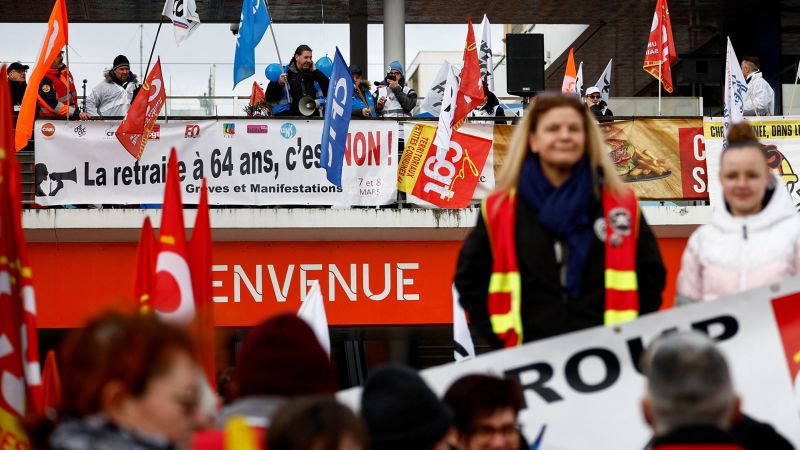The Paris protest of Sunday, April 17: The French parliament is ready to take down its own. Mr. Macron’s budget crisis is on the agenda
There were tens of thousands of people who took to the streets of Paris on Sunday to protest rising living costs and the strike action that is threatening to spread further.
The coalition of left-wing parties plan to use the cost-of-living crisis and assert itself as the main opposition force to President Emanuel Macarone’s administration. But on Sunday, organizers signaled that they intended to build momentum from the climate of social unrest to increase pressure on Mr. Macron’s government.
“We need to be tougher,” said David Guiraud, a lawmaker from France Unbowed, the hard-left party that led Sunday’s protest. He added that the government could “no longer decide on its own.”
Mr. Macron finds himself in a perilous situation. Labor strikes and a fierce opposition in the National Assembly, the lower and more powerful house of Parliament, may attempt to bring down his government this week over a budget bill.
Most of the lines on the metro are expected to only run at the busiest times, according to the transport agency RATP. The main education trade union FSU said Sunday that 120 schools would close for the day and 60% of primary school teachers would be on strike in the French capital.
At Charles de Gaulle and Orly airports in Paris, airlines have been asked to reduce flights by 20% and 30%. Air France said about 20% of short-haul flights would be canceled, but long-haul services would be maintained. The airline cautioned, however, that “last-minute delays and cancellations cannot be ruled out.”
National railway operator SNCF said very few regional trains would operate and that four out of five trains on the TGV, France’s intercity high-speed rail service, would be canceled.
The French pension system is not in danger, but it is going up a gear: workers are mobilizing to the government and the economy is in crisis
Philippe Martinez, secretary general of the CGT, the biggest French union, said in an interview with Le Journal du Dimanche Sunday that unions “are moving up a gear” and he expected “that the mobilizations will continue and grow until the government listens to workers.”
France has endured a series of strikes this year, as workers rail against President Emmanuel Macron’s planned pension reforms. The retirement age of most French citizens will increase to 64 from 62 after the reforms are implemented.
A record 1.3 million people took part in demonstrations on January 19, which brought the country to a standstill and shuttered the Eiffel Tower to visitors.
The pension legislation is necessary to tackle a funding deficit, but has angered workers at a time when living costs are rising.
If there is no opposition to the government, it will be able to push the bills through without a parliamentary vote.
The latest plans are a much more straightforward attempt to balance the system’s finances by making the French work longer, an effort that the government acknowledges will be difficult for some but that it insists is necessary.
France has one of the lowest rates of pensioners at risk of poverty in Europe, and a net pension replacement rate — a measure of how effectively retirement income replaces prior earnings — of 74 percent, according to the Organization for Economic Cooperation and Development, higher than the O.E.C.D. and European Union averages.
The system is in an increasingly precarious state according to the government. In 2000, there were 2.1 workers paying into the system for every one retiree; in 2020 that ratio had fallen to 1.7, and in 2070 it is expected to drop to 1.2, according to official projections.
Antoine Bozio, an economist at the Paris School of Economics, said that there was no short-term “explosion of the deficit” that needed to be addressed urgently. But “once you’ve said that the system isn’t in danger or on the verge of a catastrophe,” he said, “that doesn’t mean there isn’t a problem” in the long term.
